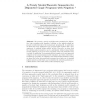28 search results - page 2 / 6 » A Syntax-Independent Approach to Forgetting in Disjunctive L... |
116
Voted
CORR
2002
Springer
15 years 2 months ago
2002
Springer
Abstract. Logic Programming paradigms that allow for expressing preferences have drawn a lot of research interest over the last years. Among them, the principle of ordered disjunct...
125
Voted
LPNMR
2001
Springer
15 years 7 months ago
2001
Springer
Much work has been done on extending the well-founded semantics to general disjunctive logic programs and various approaches have been proposed. However, no consensus has been reac...
128
click to vote
NMR
2004
Springer
15 years 8 months ago
2004
Springer
All major semantics of normal logic programs and normal logic programs with aggregates can be described as fixpoints of the one-step provability operator or of operators that can...
126
Voted
AMAI
2007
Springer
15 years 2 months ago
2007
Springer
Abstract. Partial equilibrium logic (PEL) is a new nonmonotonic reasoning formalism closely aligned with logic programming under well-founded and partial stable model semantics. In...
114
click to vote
LPNMR
2007
Springer
15 years 8 months ago
2007
Springer
Abstract. We present a purely model-theoretic semantics for disjunctive logic programs with negation, building on the infinite-valued approach recently introduced for normal logic...

